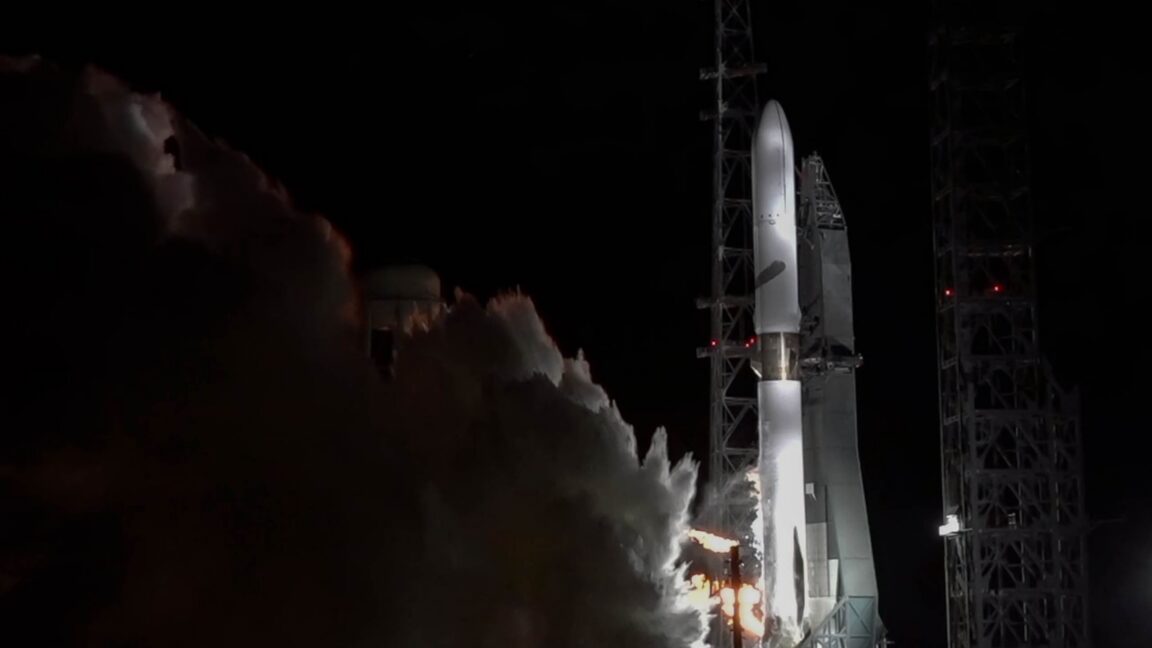Science
Blue Origin Successfully Test-Fires New Glenn Rocket for Upcoming Launch

Blue Origin’s path to the second flight of its heavy-lifting New Glenn rocket became clearer following a successful test-firing of the rocket’s seven main engines at Cape Canaveral Space Force Station, Florida. The test occurred on the evening of October 26, 2023, at 21:59 EDT (01:59 UTC October 27), with the engines firing for a total of 38 seconds while the rocket remained securely on the ground.
This hold-down firing marks the final major test before the anticipated launch, with sources indicating that the New Glenn could be ready for liftoff as early as November 9, 2023. Blue Origin’s CEO, Dave Limp, celebrated the achievement on social media, stating, “Love seeing New Glenn’s seven BE-4 engines come alive! Congratulations to Team Blue on today’s hotfire.”
The engines performed at full power for 22 seconds, producing nearly 3.9 million pounds of thrust. Limp noted that engineers intentionally extended this test-firing and shut down some engines to replicate the landing burn sequence. This simulation aims to support Blue Origin’s goal of successfully landing the booster on a barge in the Atlantic Ocean during the next flight, a feat that eluded them during the rocket’s inaugural mission in January 2023.
Preparations for the ESCAPADE Mission
Following the test-firing, Blue Origin’s ground crew will lower the more than 320-foot-tall (98-meter) rocket and transport it back to a nearby hangar for inspection. The team will also replace the rocket’s payload fairing with another clamshell that will carry two NASA-owned spacecraft destined for Mars. These twin spacecraft are part of the ESCAPADE mission, which aims to study the interaction between solar wind and Mars’ magnetosphere, a process believed to have contributed to the planet’s atmospheric escape.
NASA is leveraging a favorable deal from Blue Origin for this launch, with the agency paying $20 million, significantly less than what it would cost to secure a dedicated launch on another rocket. Nonetheless, this arrangement comes with increased risks, as the New Glenn rocket has not yet received certification from NASA or the US Space Force for high-priority government missions.
Despite these risks, NASA officials are comfortable proceeding with the ESCAPADE mission due to its status as part of a new family of cost-effective Solar System missions. The total price tag for ESCAPADE is less than $80 million, a stark contrast to the agency’s recent Mars missions, which typically exceed $800 million.
The timing of Mars missions is critical, as they usually launch from Earth only during specific windows that occur every 26 months. ESCAPADE is set to launch outside this conventional window, meaning the twin probes will remain closer to Earth until November 2024. At that time, they will execute a planned engine burn to initiate their journey to the red planet.
Future Prospects for New Glenn
The two spacecraft, developed by Rocket Lab, weigh slightly over one ton combined, which is about 15 percent of the New Glenn rocket’s total payload capacity. They are expected to reach Mars by September 2027, at which point they will begin their scientific observations.
Blue Origin’s commitment to recovering the New Glenn’s first stage during this flight is crucial for the company’s plans. If the upcoming landing attempt is unsuccessful, it is unlikely that a new first-stage booster will be ready for launch until sometime later in 2026. The stakes are high as Blue Origin prepares for the next stage of its ambitious space endeavors.
-

 World5 months ago
World5 months agoSBI Announces QIP Floor Price at ₹811.05 Per Share
-

 Lifestyle5 months ago
Lifestyle5 months agoCept Unveils ₹3.1 Crore Urban Mobility Plan for Sustainable Growth
-

 Science4 months ago
Science4 months agoNew Blood Group Discovered in South Indian Woman at Rotary Centre
-

 World5 months ago
World5 months agoTorrential Rains Cause Flash Flooding in New York and New Jersey
-

 Top Stories5 months ago
Top Stories5 months agoKonkani Cultural Organisation to Host Pearl Jubilee in Abu Dhabi
-

 Sports4 months ago
Sports4 months agoBroad Advocates for Bowling Change Ahead of Final Test Against India
-

 Science5 months ago
Science5 months agoNothing Headphone 1 Review: A Bold Contender in Audio Design
-

 Top Stories5 months ago
Top Stories5 months agoAir India Crash Investigation Highlights Boeing Fuel Switch Concerns
-

 Business5 months ago
Business5 months agoIndian Stock Market Rebounds: Sensex and Nifty Rise After Four-Day Decline
-

 Sports4 months ago
Sports4 months agoCristian Totti Retires at 19: Pressure of Fame Takes Toll
-

 Politics5 months ago
Politics5 months agoAbandoned Doberman Finds New Home After Journey to Prague
-

 Top Stories5 months ago
Top Stories5 months agoPatna Bank Manager Abhishek Varun Found Dead in Well









